初二英语课文08
牛津译林版英语初二(八年级)上册 Unit 8 Natural disasters Reading I The Taiwan Earthquake 公开课课件
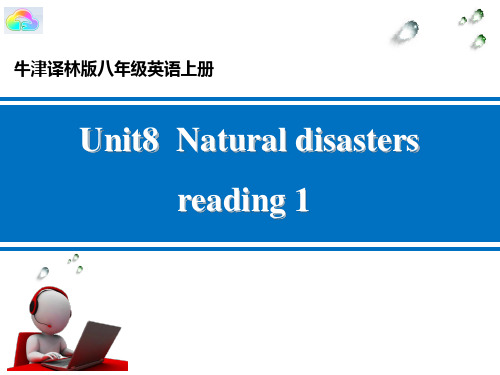
while-reading
What happens when an earthquake comes?
earthquake
ground
[ ʃeik ]
The ground starts to shake.
a slight shaking not a strong shaking
[bɒm]
The noise is like bombs under the ground.
Paragraph 2
Fill in the blanks.
The real noise was like b_o_m__b_s_ under
the ground. People ran _in__a_ll_d__ir_e_c_ti_o_n_s_.
Timmy tried his best to _r_u_n_o_u_t_ to the
How did people help Timmy?
They quickly moved away the bricks.
cleverness
bravery +ohtehleprs=’ bdraiyglhigt ht
post-re disasters Reading1
8A Unit8 Natural disasters Reading1
The terrible Taiwan earthquake
牛津译林初中八年级英语上册 Unit 8 Natural disasters reading 2课件

▪ start to shake
shake one’s head
v.
shake down the apples
shake v.& n.
shaking n.
shook
1) At first, the slight __s_h_a__k_e_/_s_h_a__k_in_gof the house made Timmy frightened.
11. … I told myself to calm down …(line12) calm down 冷静下来,平静下来
calm v. 使平静,使镇静 n. 平静,宁静 adj. 平静的,镇静的
e.g. Just calm down a bit! 你先静一静!
Can you translate the following sentences?
e.g. People screamed in fear. 人们害怕地尖叫起来。
e.g. They got lost in the forest. They had to try different ways in fear. 他们在森林里迷路了,他们不得不害 怕地尝试不同的路。
5. Some ran out of the building. (line5) run out of … 从……跑出 e.g. Some students run out of the classroom.
Fill in the blanks with the correct words or phrases:
shake fall down scream in fear in all directions
try one’s best to protect calm down
人教版英语八年级下册 Unit 8 课文解读(含单词、短语等)

Steve: Yes, Little Women. I've already finished reading it!
…Steve: It's about four sisters growing up. It was really good, so I couldn't put
it down. Which book did you choose?
带回 (代词放中间) 拓展:bring back 回想/回忆 e.g. The picture brought back a lot of happy memories. 固定搭配:call back 回电话;turn back 返回/转身; 3.bring back look back 向后看/回顾;go/come back 回来 take back 收回/取回;give back 归还 补充:该句中 I can use是定语从句,修饰先行词 things;因为关系代词that/which在定语从句中做宾 语,因此可以省略。
n. 珠宝/财富【U】;宝物/珍品【C】; v. 珍视/爱/藏 e.g. art treasures 艺术珍品 e.g. treasure their friendship 珍视他们的友谊
5. at least 至少 at most 至多 (little-less-least)
6.hurry up
赶快; 急忙=come on=be quick hurry v. 匆忙 Don’t hurry. 别着急。=take your time hurry to+地点 匆忙去某地; hurry to do sth. 匆忙做… hurry n. 匆忙 in a hurry (to do) 匆忙(做某事) in no hurry (to do sth.) 不着急(做某事)
资料《Unit8课文原文与翻译(素材)译林版八年级英语下册》
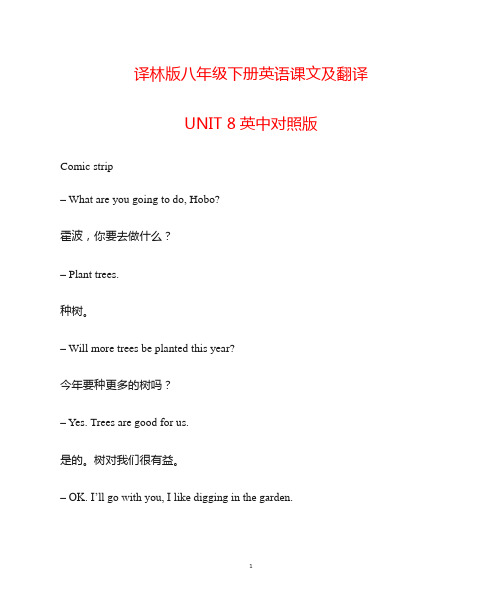
译林版八年级下册英语课文及翻译UNIT 8英中对照版Comic strip– What are you going to do, Hobo?霍波,你要去做什么?– Plant trees.种树。
– Will more trees be planted this year?今年要种更多的树吗?– Yes. Trees are good for us.是的。
树对我们很有益。
–OK. I’ll go with you, I like digging in the garden.好的。
我跟你一起去。
我喜欢在花园里挖洞。
– Are you serious?你是认真的吗?–Sure, I’ll plant breadfruit trees. Breadfruit … Yummy!当然。
我要种面包果树。
面包果……好吃!Welcome to the unit– What should we do to live a green life, class?同学们,对绿色生活我们应该做些什么呢?– My dad used to drive me to school, but now we take the underground.More and more families own cars and this causes serious air pollution.我的爸爸以前常常开车送我去上学,但是现在我们坐地铁了。
越来越多的家庭拥有汽车,导致严重的空气污染。
–I agree. It’s wise for people to choose public transport or ride bicycles.我同意。
人们选择公共交通或骑自行车是很明智的。
– I think we can take shorter showers to save water.我认为我们应该缩短淋浴时间,以节约用水。
– Yes. And we should remember to turn off the lights when we leave a room.是的。
人教版英语八年级下册Unit 8听力原文及翻译
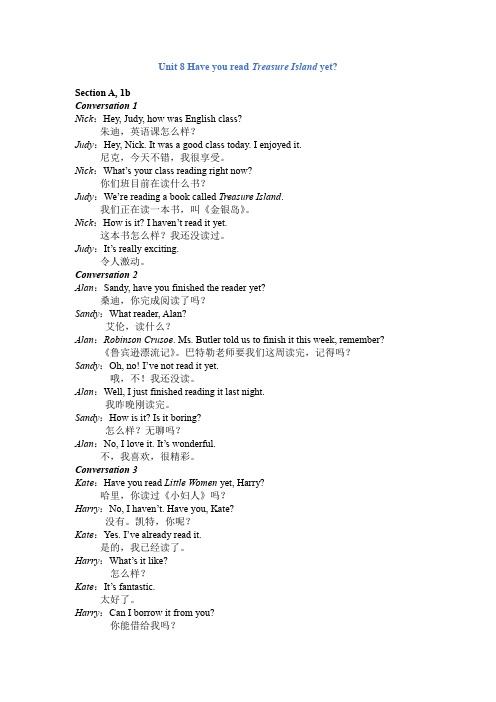
Unit 8 Have you read Treasure Island yet?Section A, 1bConversation 1Nick:Hey, Judy, how was English class?朱迪,英语课怎么样?Judy:Hey, Nick. It was a good class today. I enjoyed it.尼克,今天不错,我很享受。
Nick:What’s your class reading right now?你们班目前在读什么书?Judy:We’re reading a book called Treasure Island.我们正在读一本书,叫《金银岛》。
Nick:How is it? I haven’t read it yet.这本书怎么样?我还没读过。
Judy:It’s really exciting.令人激动。
Conversation 2Alan:Sandy, have you finished the reader yet?桑迪,你完成阅读了吗?Sandy:What reader, Alan?艾伦,读什么?Alan:Robinson Crusoe. Ms. Butler told us to finish it this week, remember?《鲁宾逊漂流记》。
巴特勒老师要我们这周读完,记得吗?Sandy:Oh, no! I’ve not read it yet.哦,不!我还没读。
Alan:Well, I just finished reading it last night.我昨晚刚读完。
Sandy:How is it? Is it boring?怎么样?无聊吗?Alan:No, I love it. It’s wonderful.不,我喜欢,很精彩。
Conversation 3Kate:Have you read Little Women yet, Harry?哈里,你读过《小妇人》吗?Harry:No, I haven’t. Have you, Kate?没有。
冀教版八年级上册英语第八单元课文翻译
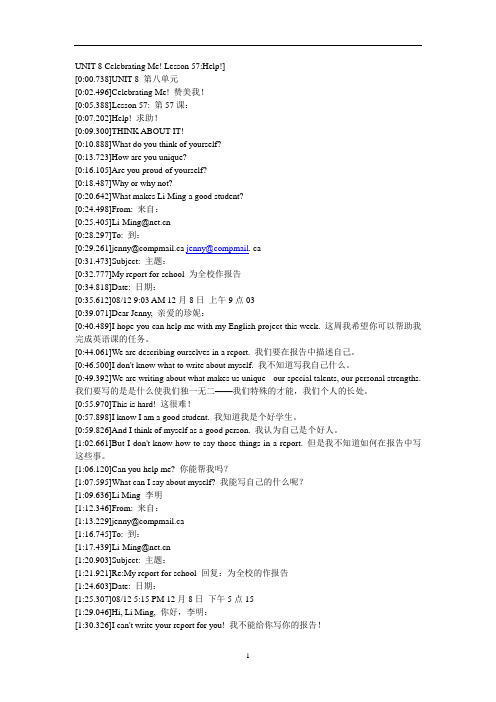
UNIT 8 Celebrating Me! Lesson 57:Help!][0:00.738]UNIT 8 第八单元[0:02.496]Celebrating Me! 赞美我![0:05.388]Lesson 57: 第57课:[0:07.202]Help! 求助![0:09.300]THINK ABOUT IT![0:10.888]What do you think of yourself?[0:13.723]How are you unique?[0:16.105]Are you proud of yourself?[0:18.487]Why or why not?[0:20.642]What makes Li Ming a good student?[0:24.498]From: 来自:[0:25.405]Li-Ming@[0:28.297]To: 到:[0:29.261]jenny@compmail.ca jenny@compmail. ca[0:31.473]Subject: 主题:[0:32.777]My report for school 为全校作报告[0:34.818]Date: 日期:[0:35.612]08/12 9:03 AM 12月8日上午9点03[0:39.071]Dear Jenny, 亲爱的珍妮:[0:40.489]I hope you can help me with my English project this week. 这周我希望你可以帮助我完成英语课的任务。
[0:44.061]We are describing ourselves in a report. 我们要在报告中描述自己。
[0:46.500]I don't know what to write about myself. 我不知道写我自己什么。
[0:49.392]We are writing about what makes us unique - our special talents, our personal strengths. 我们要写的是是什么使我们独一无二——我们特殊的才能,我们个人的长处。
八年级英语课文及翻译(精选7篇)

八年级英语课文及翻译八年级英语课文及翻译(精选7篇)英语课文翻译对于很多学生来说比较困难,不知道如何下手。
其实只要多多练习就好了。
以下是小编整理的八年级英语课文及翻译,欢迎阅读。
八年级英语课文及翻译篇1Stop talking. She is coming! Happy birthday, lingling.Oh, you remember!We have a present for you.thank youYou can turn it on! Hurry up!Oh, no! I cant open it now. For a moment!Wait a minute! In America, when someone gives you a gift, you must open it immediately.No, you cant open gifts right away in China.Also remember: when you receive a gift, you must answer it with both hands.Connect your hands! We can pick one up in England!Thats right. In addition, you must wrap a red envelope with red paper, because it symbolizes luck. You cant use white, blue, or black paper.You cant do the cleaning on the first day of the New Year.And you cant cut it.You mean to play!You cant break anything, its not lucky! Anyway, take it easy! The British tradition is strange too!And you have to eat more jiaozi!What is dumpling?Just wait and see!【翻译】大家别聊了。
八年级上册英语课文朗读人教版第8单元

八年级上册英语课文朗读人教版第8单元Unit 8: English Reading - People and PlacesIn the 8th unit of the 8th-grade textbook of English Reading, we continue to explore various texts related to people and places. In this unit, we will engage in reading passages that introduce different individuals and locations, helping us expand our vocabulary, enhance our reading comprehension, and develop our language skills. Together, let's embark on a journey of discovery through these captivating texts.1. A Day in the Life of a News ReporterThis passage introduces us to the busy life of a news reporter. Through vivid descriptions, we gain insight into the challenges they face and the tasks they perform. The text showcases the importance of effective communication, critical thinking, and adaptability in this profession. As we read, we can reflect on the qualities required to succeed as a news reporter and perhaps even gain inspiration for our own future careers.2. Exploring the City of PragueTravel enthusiasts will delight in this passage as we virtually explore the beautiful city of Prague. From its fascinating history to its architectural wonders, we dive into the charm and allure that Prague offers. Through descriptive language and engaging details, we can visualize ourselves strolling through the cobblestone streets, admiring the medieval castles, and indulging in the local cuisine. This passage not only expands our knowledge of different places but also allows us to appreciate the cultural diversity of our world.3. An Inspiring Figure: Malala YousafzaiThis empowering passage introduces us to the remarkable story of Malala Yousafzai. We learn about her advocacy for girls' education, her struggle against adversity, and her Nobel Peace Prize recognition. As we immerse ourselves in this text, we are inspired to stand up for what we believe in, appreciate the value of education, and contribute positively to our communities. The lesson from Malala's story is one of resilience, determination, and the power of raising one's voice for change.4. Nature's Marvel: The Great Barrier ReefThrough this passage, we venture into the depths of the Great Barrier Reef, one of the world's most extraordinary ecosystems. It provides us with a glimpse into the awe-inspiring beauty and biodiversity that exists beneath the ocean's surface. With engaging descriptions and facts, we learn about the importance of preserving this natural wonder and the efforts made to protect its fragile ecosystem. Reading about the Great Barrier Reef inspires us to appreciate and care for the environment in our own lives.5. The Joy of VolunteeringIn this passage, we discover the joy and fulfillment that can be found through volunteering. We encounter personal stories of individuals who dedicate their time and energy to helping others. The text emphasizes the positive impact that volunteering can have on both the beneficiaries and the volunteers themselves. Throughout the passage, we reflect on the value of empathy, kindness, and the importance of giving back to society. This reading encourages us to consider ways in which we can make a difference in our own communities.ConclusionThe 8th unit of the 8th-grade English Reading textbook introduces us to a diverse range of texts centered around people and places. Through engaging stories, descriptive passages, and inspiring narratives, we expand our understanding of the world and the individuals who inhabit it. The texts prompt us to contemplate our own roles within society and encourage us to explore our passions.As we continue our English language learning journey, let us remember the power of reading and the opportunities it presents for personal growth, cultural appreciation, and the acquisition of knowledge. May these texts serve as stepping stones to further ignite our curiosity, inspiring us to explore even more captivating stories in the future.。
八年级上册英语书人教版第八单元课文
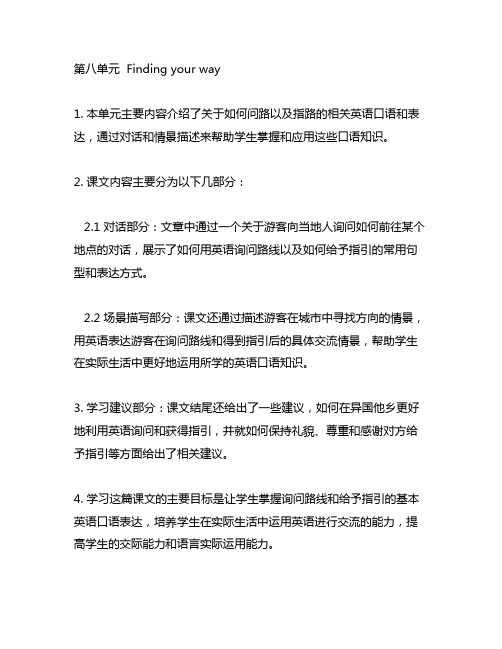
第八单元 Finding your way1. 本单元主要内容介绍了关于如何问路以及指路的相关英语口语和表达,通过对话和情景描述来帮助学生掌握和应用这些口语知识。
2. 课文内容主要分为以下几部分:2.1 对话部分:文章中通过一个关于游客向当地人询问如何前往某个地点的对话,展示了如何用英语询问路线以及如何给予指引的常用句型和表达方式。
2.2 场景描写部分:课文还通过描述游客在城市中寻找方向的情景,用英语表达游客在询问路线和得到指引后的具体交流情景,帮助学生在实际生活中更好地运用所学的英语口语知识。
3. 学习建议部分:课文结尾还给出了一些建议,如何在异国他乡更好地利用英语询问和获得指引,并就如何保持礼貌、尊重和感谢对方给予指引等方面给出了相关建议。
4. 学习这篇课文的主要目标是让学生掌握询问路线和给予指引的基本英语口语表达,培养学生在实际生活中运用英语进行交流的能力,提高学生的交际能力和语言实际运用能力。
5. 在学习本单元的过程中,老师可以通过反复的角色扮演、对话练习和情景模拟等方式,巩固学生对课文内容的理解和运用,提高学生的口语表达能力,增强学生的语言自信心。
6. 老师还可以结合课文内容进行实地教学,带领学生前往实际场景中,通过实际操作来锻炼学生的英语交际能力,提高学生在实际生活中运用英语进行交流和交流的能力。
7. 本单元的课文内容旨在帮助学生掌握和应用英语中询问路线和给予指引的常用口语表达,通过真实情景的描述和对话内容的展示,加强学生对英语口语的理解和运用能力,培养学生在实际生活中运用英语与人交流的能力。
老师在教学过程中应注重培养学生的实际语言运用能力,激发学生学习英语的兴趣和动力,提高学生的语言交际能力,使学生在未来的实际生活中能够更好地应用所学的英语知识。
第八单元 Finding your way8. 在学习英语的过程中,对话和情景模拟的练习是非常重要的一部分。
通过与同伴或老师进行角色扮演,学生可以更直接和实际地应用所学的英语口语表达,从而加深对课文内容的理解和记忆。
人教版英语八年级上册Unit 8听力原文及翻译(旧版)
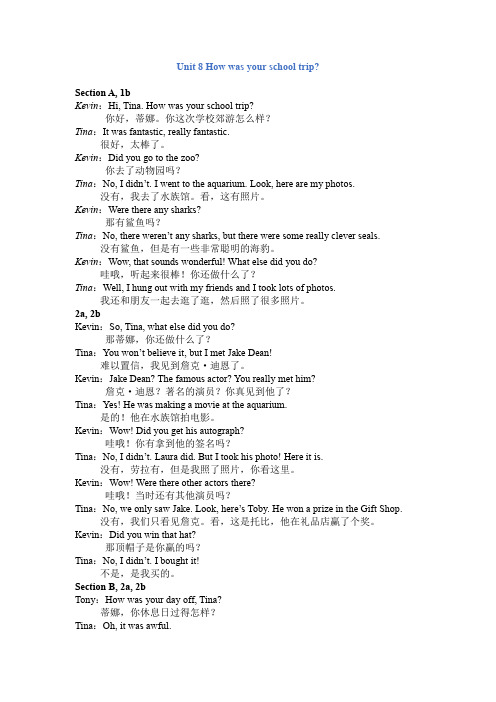
Unit 8 How was your school trip?Section A, 1bKevin:Hi, Tina. How was your school trip?你好,蒂娜。
你这次学校郊游怎么样?Tina:It was fantastic, really fantastic.很好,太棒了。
Kevin:Did you go to the zoo?你去了动物园吗?Tina:No, I didn’t. I went to the aquarium. Look, here are my photos.没有,我去了水族馆。
看,这有照片。
Kevin:Were there any sharks?那有鲨鱼吗?Tina:No, there weren’t any sharks, but there were some really clever seals.没有鲨鱼,但是有一些非常聪明的海豹。
Kevin:Wow, that sounds wonderful! What else did you do?哇哦,听起来很棒!你还做什么了?Tina:Well, I hung out with my friends and I took lots of photos.我还和朋友一起去逛了逛,然后照了很多照片。
2a, 2bKevin:So, Tina, what else did you do?那蒂娜,你还做什么了?Tina:You won’t believe it, but I met Jake Dean!难以置信,我见到詹克·迪恩了。
Kevin:Jake Dean? The famous actor? You really met him?詹克·迪恩?著名的演员?你真见到他了?Tina:Yes! He was making a movie at the aquarium.是的!他在水族馆拍电影。
人教版八年级下册英语全册课文原文+翻译

UNIT 1 What's the matter?2d 莉萨,你好吗?我头痛,并且脖子不能动。
我该怎么办?我应该量体温吗?不,听起来不像是你发烧。
周末你做什么了?我整个周末都在玩电脑游戏。
那很可能就是原因。
你需要离开电脑休息几次。
是的,我想我是一个姿势坐得太久没有移动。
我认为你应该躺下休息。
如果明天你的头和脖子还痛的话,就去看医生。
好的。
谢谢,曼迪。
2d Role-play the conversation.Mandy: Lisa, are you OK?Lisa: I have a headache and I can't move my neck. What should I do? Should I take my temperature?Mandy: No, it doesn't sound like you have a fever. What did you do on the weekend?Lisa: I played computer games all weekend.Mandy: That's probably why. You need to take breaks away from the computer.Lisa: Yeah, I think I sat in the same way for too long without moving.Mandy: I think you should lie down and rest. If your head and neck still hurt tomorrow, then go toa doctor.Lisa: OK. Thanks, Mandy.3a 昨天上午九点, 26 路公交车正行驶在中华路上,这时司机看到一位老人躺在路边。
在他旁边的一位妇女在喊救命。
公交车司机, 24 岁的王平,没有多想就停下了公交车。
【K12教育学习资料】八年级英语上册 Unit 8 Natural disasters Readin
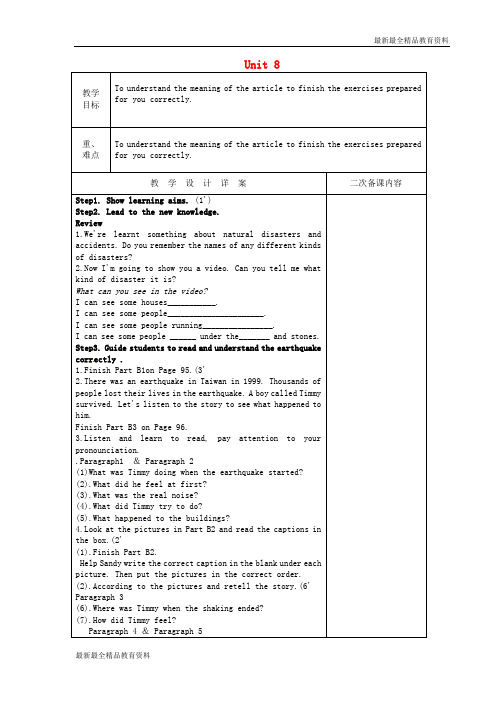
What can you see in the video?
I can see some houses___________.
I can see some people______________________.
1.Finish Part B1on Page 95.(3'
2.There was an earthquake in Taiwan in 1999. Thousands of people lost their lives in the earthquake. A boy called Timmy survived. Let's listen to the story to see what happened to him.
I can see some people running________________.
I can see some people ______ under the_______ and stones.
Step3. Guidestudents to read and understand the earthquake corr ectly .
(1).Finish Part B2.
Help Sandy write the correct caption in the blank under each picture. Then put the pictures in thecorrect order.
(2).According to the pictures and retell the story.(6'
外研版八年级(上册)英语课文[全册]
![外研版八年级(上册)英语课文[全册]](https://img.taocdn.com/s3/m/b27a1cbea0116c175f0e48d6.png)
Module 1 How to learn EnglishUnit 1 Let’s try to speak English as much as possible.Ms James: Welcome back, everyone! Today, we’re going to talk about good ways to learn English. Ready? Who has some advice?Lingling: We should always speak English in class.Ms James: Good! Let’s try to speak English as much as possible.Daming: Why not write down the mistakes in our notebooks?Ms James: That’s a good idea. And don’t forget to write down the correct answers next to the mistakes. Wha t else?Lingling: It’s a good idea to spell and pronounce new words aloud every day.Ms James: Thanks a lot, Lingling. How about listening to the radio?Lingling: Yes, that’s good for our pronunciation too. But there are so many new word. Ms James: You don’t need to understand every word. You just need to listen for key words and main ideas.Daming: That’s the same for reading. English stories are so interesting. I get to know a lot about the world th rough reading.Lingling: I think writing is also important. Why don’t we try to find some English pen friends? We can write to them. Ms James: Excellent! I agree with you.Unit 2 You should smile at her!Send your questions to Diana, the Language Doctor.Many students ask for advice about how to improve their English. Here are three basic questions.The first question is about understanding English films and songs. Li Hao from Hubei wrote, “I like watch ing English films and listening to English songs, but I can only understand a little. What can I do?”Watching films and listening to songs are great way to learn English! Watch and listen several times, and guess the meaning of the new words. Each time you will learn something new. I also advise you to talk abou t the films or songs with your friends.The second question is about speaking. Wang Fan from Jilin wrote, “Our school has a teacher from the US . I am shy and I am afraid to speak to her. What should I do?”You can say, “Hello! How are you?”“Do you like China?” These are good ways to start a conversation. And before you begin, you should smile at her! Remember this: Do not be shy. Just try.The third question is about vocabulary. Zhang Lei from Anhui wrote, “I write down new words, but I forget t hem quickly. How can I remember them?”Do not worry. It is natural to forget new words! I suggest you write four or five words a day on pieces of pap er and place them in your room. Read the words when you see them, and try to use them.Module 2 My home town and my countryUnit 1 It’s taller than many other buildings.Tony: Hey, Daming! How was your weekend?Daming: Pretty good! I went to Shenzhen.Tony: Where’s Shenzhen?Daming: Well, it’s on the coast near Hong Kong. It was a small village about thirty years ago, but today it’s a very big city.Tony: So it’s a newer city than Hong Kong?Daming: Yes, it’s a newer city. In fact, it only became important in the 1980s.It’s getting bigger and busier. S ome day it will become as busy as Hong Kong, I’m sure.Tony: What’s the population of Shenzhen?Daming: It’s over ten million, I think. That’s larger than the population of many other cities in China. Its stre ets are much wider and cleaner too. I think it’s a beautiful city.Tony: I’d like to go to there one day.Daming: Remember to visit the Diwang Tower. It’s taller than many other buildings in Shenzhen.Unit 2 Cambridge is a beautiful city in the east of England.Cambridge, London and EnglandBy Tony SmithI come from Cambridge, a beautiful city in the east of England. It is on the River Cam and has a populati on of about 120,000. My home is especially famous for its university. Many famous people studied here, suc h as Isaac Newton and Charles Darwin. There are lots of old buildings and churches to visit. Students and to urists enjoy trips along the river by boat.Cambridge is 80 kilometres from London. London is in the south of England and it is on the River Tham es. It has a population of about seven and a half million, so it is bigger and busier than Cambridge. It is abou t 2,000 years old, and it is famous for Big Ben, Buckingham Palace and Tower Bridge.England itself is a part of an island, and you are always near the sea. The small villages and beaches on t he coast are popular for holidays. Tourists like the areas of low and beautiful lakes in the north, and the hills and pretty villages in the south. Everywhere in England you will notice how green the countryside is.It is never very hot in summer or very cold in winter. So come and see England any time of the year, but b ring an umbrella with you. You will need it most days.Module 3 SportsUnit 1 Nothing is more exciting than playing tennis.Daming: Hey, Tony. Come and watch the football match on TV.Tony: OK. What’s the score?Daming: Spain scored a minute ago.Tony: Wow! That’s fast!Daming: That’s right. Last week the match on TV was so boring because no one scored at all. So this week’s match is already more exciting.Betty: What’s the matter with you, Tony? You look tired.Tony: I’m really tired after last night’s tennis match. And I hurt my knee.Daming: That’s too bad! Sit down and watch the match. It’s safer than playing tennis.Betty: Yes, watching is not sure about that. Nothing is more relaxing too!Tony: Well, I’m not sure about that. Nothing is more enjoyable than playing tennis.Betty: But you enjoyed watching the Olympics on TV, right?Tony: Yes, but that’s because it was cheaper than buying tickets for all the games.Daming: And staying at home was easier than going to the stadium. Oh, look at that!Tony: Oh, he missed! Oh, bad luck!Daming: Never mind. There’s still plenty of time for them to score.Unit2 This year we practice more carefully.Training hardBy Li Daming It is Saturday tomorrow, but I am going to school. I am not going for lessons, but to play football. I am in our school team and we are going to play against another school next week. The practice starts at 10 am. We all arrive as early as we can so that we have time to warm u p. We are training harder than usual because the other team beat us last year. This year we wa nt to do better.It is more difficult to practise in winter because the days are short and the weather is cold too. It gets dark earlier, so it is important not to be late for after-school practice.Our coach is pleased because we are playing better as a team now. Last year we were so metimes careless when we passed the ball and we lost to the other team in the final match. W hat a pity! This year we practise more carefully. That means we have a better chance of winn ing.The fan club has fewer people this year. We hope to play well so that we have more fans t o watch the matches. It is good to have our fans around. They cheer us on loudly and we feel more confident to win the game.Module 4 Planes, ships, and trainsUnit1 He lives the farthest from schoolBetty: I was late for school today.Mum: Why? What happened?Betty: I took the bus. There was a road accident, and the traffic was very heavy. But nobody was late, except me. Maybe I should go to school by taxi.Mum: It’s the most comfortable way, but it’s also the most expensive.Betty: Then what about going by bike?Mum: That’s a good choice, but it’s a bit dangerous. There’s so much traffic.Betty: But most of my classmates ride bikes, and it’s quite safe. Don’t worry. I’ll be carefull. Mum: How does Tony go to school?Betty: He lives the farthest from school, so he takes the underground.Mum: And what about Lingling?Betty: Her home is the closest to school, so she walks.Mum: How about Daming?Betty: He goes by bus too, the same as me. But it’s so crowded! And the traffic is heavy. Mum: All right. You can ride your bike to school, but remember to be careful all the time.Unit2 What is the best way to travel?Question: What is the best way to travel from London to Amsterdam.I am planning to travel from London to Amsterdam. How long does the journey take and what is the best way to travel? Could you please tell me about the trains or ships to get there? The more information, the better. Thanks!Best answer: There are four ways to travel.A journey by train is more relaxing than by coach, but a lot more expensive. When you go by train, buy your ticket a long time before you travel. It is usually cheaper. You can go by car and by ship across the North Sea. This is the most comfortable way to travel but also t he most expensive. Book your ticket before you book your hotel. Remember that parking in Amsterdam is very expensive, so stay outside the city centre and travel in by bus or by train.The third choice is by coach. This is usually the cheapest, but in summer the coaches som etimes get crowded! And it takes you about twelve hours to get there. However, it will not co st as much as going by train.Finally, you can fly. It is the fastest and the second cheapest, but you may have to wait fo r hours at the airport because of bad weather.Well, I hope this helps! Have a great trip.Module 5 Lao She TeahouseUnit 1 I wanted to see the Beijing Opera.Listen and readBetty: Lingling and I went to Lao She Teahouse last night.Tony: How was it?Betty: It was great! You know, I wanted to see Beijing Opera, so Lingling offered to take me there. We drank tea and watched an opera.Tony: Did you understand the opera?Betty: No, it was difficult to understand the words. But the actors and actress were excellent.Tony: How long did you stay?Betty: We only planned to watch for an hour, but in the end, we stayed for three hours. Tony: Did you enjoyed it?Betty: Well, it was interesting---that’s the main thing. I hope to understand more next time. Tony: Do you often go to see Beijing Opera, Lingling?Lingling: No, I don’t. I wanted to take Betty to the teahouse because it’s famous.Tony: Who is Lao She? Betty: No idea. Ask Lingling.Lingling: Lao She is a great writer. He’s especially famous for his play Teahouse.Unit 2 It describes the changes in Chinese society.2 Read the passage and match the heading with the paragraphs.a) Lao She Teahouseb)The Story of Teahousec)Lao She1Teahouse is one of Lao She’s most famous plays. He wrote it in 1957. The play has thre e acts and shows the lives of common people in China from the end of the nineteenth century to the middle of twentieth century. It tells us the story of Wang Lifa and the customers of his teahouse in Beijing. It describes the changes in Chinese society over fifty years around the beginning of the twentieth century.2Lao She was born in Beijing in 1899. His mother sent him to a teacher’s school in 1913. After finishing school in 1918, he became a head teacher of a primary school. In 1924 Lao S he left home and went to England. He taught Chinese at a college in London and returned to China five years later. He wrote many plays, novels and short stories about people’s lives, an d was named “the People’s Artist”. Lao She is one of the greatest Chinese writers of the twen tieth century.3At Lao She Teahouse today, customers can drink tea and eat delicious Beijing food. If y ou like the Beijing Opera, traditional music or magic shows, you can enjoy them at the teaho use. Lao She Teahouse gives a warm welcome to everyone from all over the world.Module 6 Animals in dangerUnit 1 It allows people to get closer to them.Listen and read(Lingling and Betty are leaving the zoo)Lingling: Did you like the zoo?Betty: Yes! I saw the pandas at last! But I am more interested to see the pandas in the Wolon g Panda Reserve, because it allows people to get closer to them.Lingling: It’s sad to think of the pandas and other animals in danger.Betty: We need to protect them better.Lingling: Yes, Many wild animals don’t have a safe place to live, because villages and farms are growing bigger and are taking away their land and forests.Betty: Also, often there isn’t enough clean water, because we’ve made it dirty. I think we all need to help animals live in peace. Look, there’s a notice.Lingling: It says,“Help! We want to save animals in danger, and we need your help.”Betty: But what can we do?Lingling: It says,“Your money pays to look after the animals.”That means we can give mone y to help protect the animals.Betty: Maybe we can raise some money at school. Let’s find out what else we can do to save as many animals as possible.Unit 2 The WWF is working hard to save them all.2 Read the passage and match the heading with the paragraphs.a)Nature parks for pandasb) WWF And animals in dangerc) The panda’s homed) An animal in danger1Pandas are in danger. There are only about 1,600 pandas living in the wild today. Zoos a nd research centres are looking after about 340 pandas. Pandas do not have many babies, and baby pandas often die. The situation is getting very difficult. Scientist are doing a lot of rese arch to help pandas produce more babies and help baby pandas live.2Pandas live in the forests and mountains of Southwest China. Each panda needs to eat a lot of bamboo every day. The bamboo forests are getting smaller, so pandas are losing their h ome. And there are not many pandas left.3In order to protect pandas in the wild, the government is setting up nature parks and dev eloping other plans. The nature parks will be big and there will be more bamboo to feed the p andas. Pandas born in zoos may go back to live in the nature parks.4The World Wild Fund for Nature (WWF) wants to protect all animals. And it chose the panda to be its symbol. We do not want to lose tigers, elephants, or any other animals, so the WWF is working hard to save them all.Module7 A famous storyUnit1 Alice was sitting with her sister by the river.Tony: Hi,Lingling!Lingling: Ssh! I’m reading.Tony: Sorry! What’s the book about?Lingling: It’s about a girl called Alice. One day, Alice was sitting with her sister by the ri ver and she saw a white rabbit with a watch. It ran past.Tony: Why was it running? Lingling: Because it was late. Tony: And where was it going? Lingling: To see the Queen of Hearts. Alice followed it and fell down a hole in the ground .Tony: Yes! Then she saw the Cheshire Cat. It was sitting in a tree and smiling at everyone. Lingling: Then Alice arrived at the March Hare’s house. He was sitting with the Mad Hatter and a mouse. They were having a tea party in the garden.Tony: And then Alice met the Queen of Hearts. She was playing a strange game!Lingling: Do you already know the book?Tony: Yes, It’s Alice’s Adventures in Wonderland. Everyone in Britain knows the story.Lingling: Then why did you ask me all those questions?Tony: To see if you remember the story! Ha ha….U2 She was thinking about her cat.Alice was sitting with her sister by the river and her sister was reading a book. Alice ha d nothing to do. Once or twice she looked into her sister’a book. “And what is a book for,” th ought Alice,”without pictures or conversations?” Suddenly a white rabbit with pink eyes ran by.There was nothing strange about that. She heard the rabbit say, “Oh dear! Oh dear! I’ll b e late!” and she did not think it was strange. Then the rabbit took a watch out of its pocket an d looked at it. A rabbit with a pocket and a watch. Alice got up and ran across the field after i t. She saw it go down a large rabbit hole in the ground.Then Alice went down after it, but never thought about how she was going to get out ag ain. She found that she was falling down a very, very deep hole. It was too dark for her to see anything. She was falling for a long time. While she was falling, she was thinking about her cat, Dinah. Suddenly she landed on some dry leaves…Module 8Unit1 while the lights were changing to red ,a car suddenly appearedBetty: Good morning, Ms James! You look pale. Are you all right?Ms James: Im OK, but I saw an accident. A boy was riding his bike and listening to music on the road.Daming: That’s very dangerous!Ms James: I was waiting to cross the road. While the lights were changing to red, a car sudde nly appeared round the corner. It wasn’t going fast, but it didn’t stop.Lingling: Did the boy stop?Ms James: No. And the driver was talking on his mobile phone.Betty: So did the car hit the boy?Ms James: No, I’m glad to say. The car stopped just in time, but the boy fell off his bike and hurt his knee.Tony: That’s too bad.Ms James: So when youre on your bike, think about the risk of an accident! Pay attention, s top at the red lights and…..what else?Betty: Don’t ride too fastDaming : Don’t ride side by side with your friends.All: Don’t listen to music!Unite 2One day, when Henry was working in a restaurant, a snake suddenly appeared and bit his hand. A few days earlier, the snake arrived from Asia in a box of bananas. It climbed out an d hid somewhere.“I was trying to pick it up when it bit me again. I threw it across the kitchen, and it lande d on a table.’’While the snake was lying on the table, Henry quickly picked up his mobile phone and t ook a photo with it. Then the snake hid behind the fridge When Henry was trying to find the snake, his hand began to hurt badly. He hurried to hospital. As the doctors were checking hi m, the pain got worse . But they could not help him because they did not know what kind of snake bit him.As he was lying there in great pain, Henry suddenly remembered the photo. The doctors sent the photo to a zoo. As soon as they learnt what kind of snake bit him, they gave Henry the right medicine and he left hospital the next day.“So if a snake bites you, take out your mobile phone or camera. Take its photo, and show t he photo to the doctors ‘’, suggests Henry.“But as you know, the snake won’t smile!”Module 9 PopulationUnit1 the population of China is about 1.37 billionBetty: What are you doing?Tony: I’m preparing some notes for a report called “Our growing population.”Lingling: Well, were in the right place to talk about that! Beijing is a huge city with a big pop ulation that causes a lot of problems, such as too much traffic and noise.Betty: Its not only Beijing. Population increase is a big problem in many countries. Do you k now how many babies are born every minute in the world?Tony: No. Can you tell me?Betty: Over 250! That makes over 131.4 million births a yearLingling: I can’t believe it!Betty: The population of China is about 1.37 billion. Thats almost one fifth of the world’s po pulation, that is, about 7 billion.Tony: Hang on a minute! I’ll write that down too!Betty: But in the future, Chinas population wont grow so fast, because families are getting s maller.Lingling: How do you know all this?Betty: I wrote my report yesterday!Tony: Great, thanks! Now I can write my report!Unit 2Jo is fifteen and lives in Parkville.When Jo’s grandparents first came to Parkville, it was a quiet village. They had a small house. Close to fields md hills. Parkville was near Arnwick, a city with 200,000 people. Peo ple from Parkville moved to Armwick to find jobs. And they needed places to live. However, it was expensive to live in the city centre, so the government built flats outside t he centre. Soon, Parkville became part of Arnwick.And Arnwick became a city with over a million people. Jo’s family lives in one of those flats. It is very crowded, and rubbish is also a problem.The small local school in Parkville closed down five years ago, so Jo now has to go to a sc hool in Arnwick with 2,000 pupils. It takes an hour to get there by bus. There is a lot of traffi c and pollution. It is clear that Arnwick needs more schools, buses and hospitals. It needs fresh air clean water and better public services. It also needs more police to protect its people. But to do all these things, it needs more money.However, can money help solve all these problems? Do we need more big cities like this ? In fact, this is just a story. In fact, this is just a story.But it describes what is happening all over the world. Could it be your town some day? Module 10 The weatherUnit 1 It might snowBetty: Hey, boys!Tony: Hi, Betty. Hi, Lingling, Where are you going?Betty: We’re going to the park to skate, There’s thick ice on the lake, Are you coming with US?Tony: Are you joking? It’s really cold today.Daming: And it’s cloudy too so it might snow.Lingling: What’s the temperature?Tony: It’s between minus eight and minus two degrees! Winter is colder here than i England.Daming: Is it snowy in England in December?Tony: Not usually, although this year it snowed quite a lot, Most Decembers are we and rainy .Daming: What’s the weather like in America in winter, Betty?Betty: We have cold winters and hot summers. It’s snowy in New York in winter.Tony: Sounds great ! I like sunny weather, and I like snow as well. But I don’t like showers o r windy weather.Betty: Me neither, Rainy weather is terrible! I wish I were in Australia now, It’s Probably sun ny and hot there.Lingling: You can go to Hainan lsland if you like sunny weather.Betty: One day I will.Lingling: Come on, better get going! We can skate in the park and get warm.Unit 2 The weather is fine all year round.The US is a very big country.It is about 3,000 miles from the east coast to the west coast, so choose carefully the places to see and the time to go. Bring a map because you may want to travel around. New York a nd Washington D.C. are good places to visit in May or October, but in winter there is a lot of snow.The best time to visit New England is in September.The weather gets cooler, and the green leaves start to turn gold, then brown. Bring your c amera so you can take photos of the autumn trees.California is on the Pacific coast, and the weather is fine all year round. Take your swimming clothes because you might want to go s wimming in the sea, even in December.In Seattle, in the northwest, it is not very cold but it rains a lot, so bring an umbrella.In Alaska the days are long and warm in summer, but may be cool in the evening. In winter, Alaska can be very very cold. If you want to visit Alaska, you had better go in summer. Do not forget to bring a warm sweater with you.In Texas and the southeast, it is usually very hot and sunny compared to other places. There are storms from time to time in summer and autumn.So when is the best time to visit the US? Any time you like!Module 11 Way of lifeUnit 1 In China, we open a gift laterBetty: Happy birthday, Lingling.Daming: Here’s your gift.Lingling: Oh, you remembered! What a surprise!Tony: You can open it!Lingling: I don’t think I should open it now. In China, we open a gift later.Betty: But back in the US, we open a gift immediately.Lingling: So what do I do?Betty: You needn’t wait!(Lingling opens her present and finds a dictionary.)Lingling: Oh, thank you. I really wanted one.Betty: We’re happy you like it.Tony: I noticed another difference. In China, you accept a gift with both hands. But in the West, we usually don’t pay much attention to that.Betty: That’s interesting! I’m interested to know all the Chinese traditions. Tell me more. Lingling: There are a lot. For example, in my home town, people say you mustn’t do any cle aning on the first day of the Spring Festival. And you mustn’t break anything. It’s bad luck! Daming: You must only use red paper for hongbao because red means luck. And you’d better not cut your hair during the Spring Festival month.Daming: And in the north of China, people eat lots of jiaozi!Betty: Perfect! They taste great.Tony: I like eating jiaozi too. Anyway, the Spring Festival is still over a month away. Let’s c elebrate Lingling’s birthday first!Unit 2 In England you usually drink tea with milk.My experiences in England. I went to England last year. I enjoyed my stay, and I noticed something interesting with the English way of life.For example, you must say Mr or Mrs wh en you meet someone for the first time. When you get to know each other better or when the y ask you to, you can just use their first names.One day we visited some friends and had afternoon tea together. Afternoon tea is not just a drink but a light meal at around 4 pm. We ate sandwiches and a large fruit cake.In England you usually drink tea with milk.So I tried to drink tea with milk too.Fish and chips is the traditional food in England. You can buy it and eat it in special fish and chip shops on the high street, or you can take it away and eat it with your fingers. It is delicio us!At the bus stop you must not push your way onto the bus. You need to stand in a line be hind the other people and wait your turn. Sometimes people are slow to get on the bus. Once I noticed a gentleman touch a young man on the shoulder, smile politely and say, “E xcuse me! Are you waiting for this bus?” He was really polite.Module 12 HelpUnit1 What should we do before help arrives?Ms James: This mornings class is about first aid, or giving someone basic medical help. L et’s imagine an accident. A boy is lying at the bottom of the stairs. He isn’t moving or making a sound. He is in pain. What can we do to help him?Betty: First of all, find out what’s wrong with him.Ms James: How do we do that?Betty: Ask him.Ms James: Ok. But he could have trouble hearing you or speaking to you.Lingling: Shout for help? Call 120?Ms James: Good idea, but what should we do before help arrives?Tony: Make him comfortable.Ms James: And how can we do that?Tony: Lift him up and sit him on a chair?Ms James: No, that could be harmful! You could drop him and hurt him even more. Betty, yo u must know! You did some basic medical training.Betty: Make sure he’s warm. Cover him with a coat.Ms James: That’s such good advice that you could be a doctor, Betty!Unit 2 Stay away from windows and heavy furniture.What to do in an earthquakeEarthquakes always happen suddenly, so it is difficult to warn people about them. Usually people have little or no idea about what to do during an earthquake, so here is some advice. Inside Do not jump out of high buildings. Hide under a table. Stay away from windo ws and heavy furniture. Keep clear of fires. Leave the building quickly when the ground stop s shaking, but do not use the lift.Keep calm, especially when you are with other people. Be b rave and be helpful.Outside Move away from buildings, because parts of a building may fall on you. Do not stand near street lights or under power lines. Stay away from bridges and trees. If you are in a bus or car, stay in it.In the mountains, be careful of falling rocks.On a beach, run away fro m the sea and move quickly to higher ground.In short, follow what you learnt in school. You can be safe and you can also help save oth ers。
2015春八年级下册英语课文原文Unit8
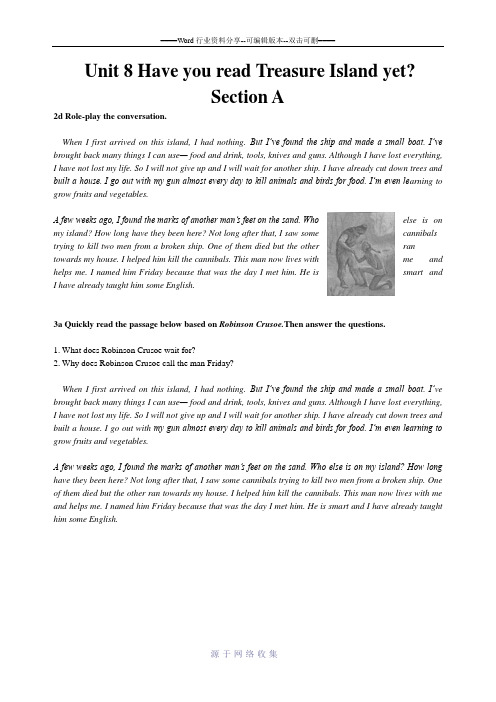
Unit 8 Have you read Treasure Island yet?Section A2d Role-play the conversation.When I first arrived on this island, I had nothing.But I’ve found the ship and made a small boat. I’ve brought back many things I can use— food and drink, tools, knives and guns. Although I have lost everything, I have not lost my life. So I will not give up and I will wait for another ship. I have already cut down trees and built a house. I go out with my gun almost every day to kill animals and birds for food. I’m even le arning to grow fruits and vegetables.A few weeks ago, I found the marks of another man’s feet on the sand. Who else is on my island? How long have they been here? Not long after that, I saw some cannibals trying to kill two men from a broken ship. One of them died but the other ran towards my house. I helped him kill the cannibals. This man now lives with me and helps me. I named him Friday because that was the day I met him. He is smart and I have already taught him some English.3a Quickly read the passage below based on Robinson Crusoe.Then answer the questions.1. What does Robinson Crusoe wait for?2. Why does Robinson Crusoe call the man Friday?When I first arrived on this island, I had nothing.But I’ve found the ship and made a small boat. I’ve brought back many things I can use— food and drink, tools, knives and guns. Although I have lost everything, I have not lost my life. So I will not give up and I will wait for another ship. I have already cut down trees and built a house. I go out with my gun almost every day to kill animals and birds for food. I’m even learning to grow fruits and vegetables.A few weeks ago, I found the marks of another man’s feet on the sand. Who else is on my island? How long have they been here? Not long after that, I saw some cannibals trying to kill two men from a broken ship. One of them died but the other ran towards my house. I helped him kill the cannibals. This man now lives with me and helps me. I named him Friday because that was the day I met him. He is smart and I have already taught him some English.Section B2b Read the passage and complete the fact sheet on page 63.A Country Music Song Changed Her Life Forever When Sarah was a teenager, she used to fight over almost everything with her family. But five years ago, while she was studying abroad in England, she heard a song full of feelings about returning home on theradio. It made Sarah think about her family and friends back in the US. She came to realize how much she actually missed all of them. Ever since then, she has been a fan of American country music.Country is a traditional kind of music from the southern states of America. Nashville, Tennessee is the home of country music. Many songs these days are just about modern life in the US, such as the importance of money and success, but not about belonging to a group. However, country music brings us back to the “good old days” when people were kind to each other and trusted one another. It reminds us that the best things in life are free —laughter, friends, family, and the beauty of nature and the countryside.Sarah hasn’t been to Nashville yet, but it is her dream to go there one day. She hasalready read a lot about the place and done some research on it. She knows that there is aCountry Music Hall of Fame Museum in Nashville. There are also always a lot of greatcountry music concerts with famous musicians and singers, like Garth Brooks. Sarah hasalready listened to most of his songs. “Garth is one of the most successful musicians inAmerican history. He’s sold more than 120 million records. I hope to see hi m sing liveone day!”Summarizing While reading, make notes or underline the main ideas in the text. After reading, write a short summary in your own words. This can help you better understand the text.。
初二英语课文原文

初二英语课文原文The original text of the second-year English textbook is a crucial component of the language learning process for students at this level. It serves as a foundation for developing proficiency in the English language by exposing learners to a variety of vocabulary words grammar structures and idiomatic expressions in a structured and engaging manner. The textbook content is carefully curated to align with the language learning objectives and proficiency levels of second-year students ensuring that the material is both challenging and accessible.One of the primary benefits of the original text in the second-year English textbook is its ability to introduce new vocabulary words in context. Rather than presenting students with a list of isolated words to memorize the textbook weaves new lexical items into engaging narratives dialogues and informational passages. This contextual approach not only helps learners better understand the meaning and usage of new words but also reinforces their retention through repeated exposure and application within authentic language scenarios.Additionally the original text in the second-year English textbook often features a range of grammatical structures that are essential for developing proficiency in the language. From basic sentence structures to more complex verb tenses and syntactical patterns the textbook systematically introduces and reinforces these grammatical concepts through targeted exercises and activities. By encountering these structures in context rather than in isolation students are better able to internalize the rules and apply them effectively in their own written and oral communication.Another key aspect of the original text in the second-year English textbook is its emphasis on idiomatic expressions and conversational language. These linguistic features are crucial for achieving fluency and natural-sounding speech as they often defy literal translation and require a deeper understanding of the language's nuances and cultural underpinnings. The textbook's inclusion of dialogues role-playing scenarios and reading passages that incorporate idiomatic expressions helps students become more attuned to the rhythms and patterns of authentic English discourse.Furthermore the original text in the second-year English textbook is often designed to foster critical thinking and analytical skills. Rather than simply presenting information the textbook may include thought-provoking questions prompts for discussion oropportunities for learners to engage in research and project-based learning. This encourages students to move beyond passive reception of language content and actively participate in the learning process by applying their knowledge to real-world scenarios or complex problem-solving tasks.The original text in the second-year English textbook also serves as a valuable resource for developing cultural awareness and intercultural communication skills. Through the inclusion of diverse perspectives narratives and cultural references the textbook exposes students to the rich tapestry of the English-speaking world. This exposure not only enhances students' understanding of the language but also fosters a greater appreciation for the cultural diversity and global interconnectedness that characterize the use of English in the 21st century.In addition to the linguistic and cultural benefits the original text in the second-year English textbook often incorporates engaging and age-appropriate themes and topics that resonate with the learners. From exploring the wonders of the natural world to delving into the aspirations and challenges of adolescence the textbook content aims to capture the interests and lived experiences of second-year students. This relevance and relatability can significantly enhance student motivation and investment in the language learning process.Moreover the original text in the second-year English textbook is typically designed with a clear pedagogical framework in mind. The sequencing and scaffolding of the content the integration of formative and summative assessments and the provision of supplementary resources and activities all contribute to a cohesive and comprehensive learning experience. This intentional design ensures that the textbook content not only imparts linguistic knowledge but also fosters the development of essential language learning strategies and study skills.Finally the original text in the second-year English textbook serves as a foundation for ongoing language learning and skill development. As students progress through their educational journey the knowledge and skills acquired through the second-year textbook content will serve as a springboard for more advanced language study. The textbook lays the groundwork for continued growth in areas such as academic writing critical analysis intercultural communication and professional communication ultimately preparing students for success in their future academic and professional endeavors.In conclusion the original text of the second-year English textbook is a vital component of the language learning process for students at this level. Through its carefully curated content the textbook supports the development of vocabulary grammar idiomaticexpressions and cultural awareness while also fostering critical thinking and engaging learners with relevant and age-appropriate themes. As a comprehensive and intentionally designed resource the second-year English textbook lays a strong foundation for ongoing language proficiency and lifelong learning.。
初二英语课文上册
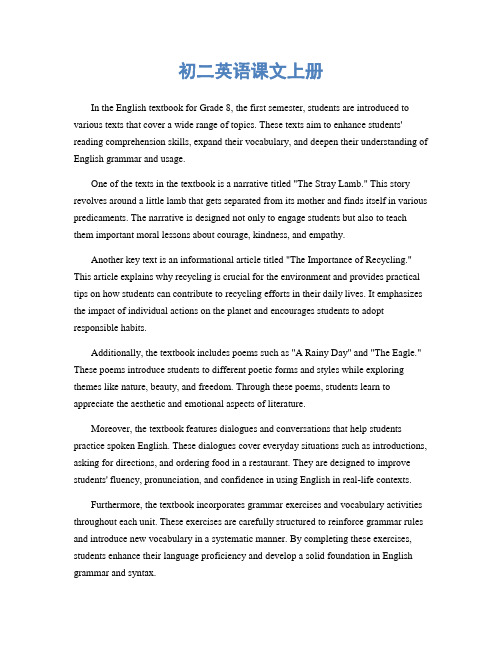
初二英语课文上册In the English textbook for Grade 8, the first semester, students are introduced to various texts that cover a wide range of topics. These texts aim to enhance students' reading comprehension skills, expand their vocabulary, and deepen their understanding of English grammar and usage.One of the texts in the textbook is a narrative titled "The Stray Lamb." This story revolves around a little lamb that gets separated from its mother and finds itself in various predicaments. The narrative is designed not only to engage students but also to teach them important moral lessons about courage, kindness, and empathy.Another key text is an informational article titled "The Importance of Recycling." This article explains why recycling is crucial for the environment and provides practical tips on how students can contribute to recycling efforts in their daily lives. It emphasizes the impact of individual actions on the planet and encourages students to adopt responsible habits.Additionally, the textbook includes poems such as "A Rainy Day" and "The Eagle." These poems introduce students to different poetic forms and styles while exploring themes like nature, beauty, and freedom. Through these poems, students learn to appreciate the aesthetic and emotional aspects of literature.Moreover, the textbook features dialogues and conversations that help students practice spoken English. These dialogues cover everyday situations such as introductions, asking for directions, and ordering food in a restaurant. They are designed to improve students' fluency, pronunciation, and confidence in using English in real-life contexts.Furthermore, the textbook incorporates grammar exercises and vocabulary activities throughout each unit. These exercises are carefully structured to reinforce grammar rules and introduce new vocabulary in a systematic manner. By completing these exercises, students enhance their language proficiency and develop a solid foundation in English grammar and syntax.Overall, the Grade 8 English textbook provides a comprehensive approach to language learning, encompassing reading, writing, speaking, and listening skills. It aims to cultivate students' appreciation for literature, foster critical thinking abilities, and prepare them for effective communication in English. Through engaging texts, practical exercises, and meaningful activities, the textbook equips students with the necessary tools to become proficient English language users.。
人教版英语八年级下册Unit8听力原文及翻译
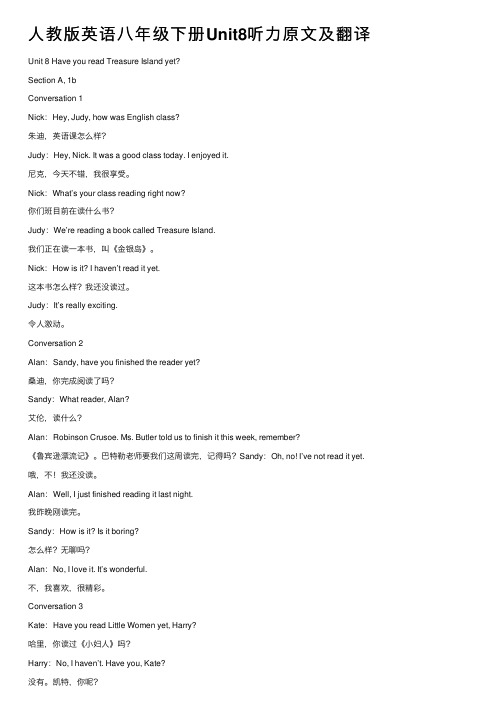
⼈教版英语⼋年级下册Unit8听⼒原⽂及翻译Unit 8 Have you read Treasure Island yet?Section A, 1bConversation 1Nick:Hey, Judy, how was English class?朱迪,英语课怎么样?Judy:Hey, Nick. It was a good class today. I enjoyed it.尼克,今天不错,我很享受。
Nick:What’s your class reading right now?你们班⽬前在读什么书?Judy:We’re reading a book called Treasure Island.我们正在读⼀本书,叫《⾦银岛》。
Nick:How is it? I haven’t read it yet.这本书怎么样?我还没读过。
Judy:It’s really exciting.令⼈激动。
Conversation 2Alan:Sandy, have you finished the reader yet?桑迪,你完成阅读了吗?Sandy:What reader, Alan?艾伦,读什么?Alan:Robinson Crusoe. Ms. Butler told us to finish it this week, remember?《鲁宾逊漂流记》。
巴特勒⽼师要我们这周读完,记得吗?Sandy:Oh, no! I’ve not read it yet.哦,不!我还没读。
Alan:Well, I just finished reading it last night.我昨晚刚读完。
Sandy:How is it? Is it boring?怎么样?⽆聊吗?Alan:No, I love it. It’s wonderful.不,我喜欢,很精彩。
Conversation 3Kate:Have you read Little Women yet, Harry?哈⾥,你读过《⼩妇⼈》吗?Harry:No, I haven’t. Have you, Kate?没有。
- 1、下载文档前请自行甄别文档内容的完整性,平台不提供额外的编辑、内容补充、找答案等附加服务。
- 2、"仅部分预览"的文档,不可在线预览部分如存在完整性等问题,可反馈申请退款(可完整预览的文档不适用该条件!)。
- 3、如文档侵犯您的权益,请联系客服反馈,我们会尽快为您处理(人工客服工作时间:9:00-18:30)。
Then the teacher says:"Stop and put your hands in front of you now." The six students put their closed hands in front of them. Now the other stuents open their eyes, and guess who has the eraser. They ask question like "Li Lei, is it in your right hand?" They can have only five guesses.
在教室前排。
A: Where do the twins sit?A:
双胞胎坐在哪里?
B: In the middle of the classroom.B:
在教室中间。
A: Where does Bill sit in the classrooom?A:
比尔坐在教室的那块儿?
初二课文:Unit 08 Where do you sit
A: Where does the teacher stand?A:
老师站在哪里?
B: On the left.B:
站在左边。
A: Where does Li Lei sit?A:
李磊坐在哪里?
B: At the front of the classrooom.B:
B: In the back row.Bs the eraser?
谁拿着橡皮擦?
Children often love to play this game. They play it like this: six students stand in a row in front of the class. They put their hands behind their backs, so you can't see their hands. The teacher gives one of them an eraser. The eraser goes from one student to another---first one way, then another. They must keep their hands behind their backs. The other students in the class keep their eyes closed. They mustn't look.
然后老师说:"现在停止,并把手放在面前。"6个学生将握紧的手放在前面。现在其余的学生张开眼,然后猜谁手里有橡皮擦。他们提出问题如:"李磊,橡皮擦在你右手里吗?"他们只能猜五次。
